Rick Wayne's Blog, page 33
November 20, 2019
(Fiction) The Game With No Winners
The night before our arrival, we stopped at a roadside motel just outside Hattiesburg, Mississippi. I was looking out the window when she woke in the middle of the night.
“Something wrong?” she asked, eyes still squinting with sleep.
I shook my head, but I didn’t move.
“Are you sure?”
“I was a very spoiled girl,” I said. “Did I ever mention that?”
She shook her head.
By the time I was 13, I told her, I had already noticed how the men looked at me differently, old and young both. At first, it bothered me—that they dared be so presumptuous as to cast their gaze on me in that manner, and I made loud, showy attempts to put them off. But no sooner had their gaze turned elsewhere than I found I wanted it back. I replaced the ribbons in my hair with pins of gold. I dabbed color on my lips. I started pestering my father for the latest fashion, dresses from Vienna and Paris.
When I was 15, I lost my virginity to a hussar nearly twice my age. He was not especially handsome, but he was cocky and brave. I did not want a nice boy, someone my age who might in the moment be too noble or too timid to do what I intended. Nor did I choose a man of my station, who might spread rumors about me. I chose a young officer, the son of a tradesman, who was garrisoned on my father’s estate. I observed his habits, and finding that he was, like the servants, an early riser, I woke before dawn to bathe in the pond near the stables, as I had when I was a little girl. If I were caught, I decided I was just young enough to claim I had no idea why I shouldn’t do such things anymore. I would let my father fluster and fumble for an explanation, and then I would agree never to do it again, despite that I didn’t understand, and then kiss him on the cheek and waltz away humming some innocent tune.
I was not caught. But I was foolish. We were too close to the servants’ quarters, and my hussar glanced back and quickened his pace at the sight of my folded clothes on the bank. I splashed about and called to him from the water when he passed, pretending to be a girl at play. He stopped, and I stepped out. He admired me a moment before backing away slowly, and I knew he would be mine.
Being an ambitious young cavalryman, he was taken to training even in his off time. I knew he used the rolling fields near the far border of my father’s land, beyond which was a great and old forest that I was forbidden to enter. There were highwaymen, I was told, who were dangerous but who would not dare step from the cover of the trees that ran in a crisp line along the border of the field, so crisp I was sure they were continuously cropped by the peasants from the nearby village. But I was wrong.
The forest and fields were to the north, so I rode east from the stables until out of sight and then turned to follow a dirt road that was bounded on one side by a trunk fence. When I finally found my officer practicing sword maneuvers—slicing the air, turning his horse this way and that on the grass—I slowed to a trot until he noticed me. I made a figure eight. I pranced. When he began to trot toward me, I fled, and he followed, leaping the fence at a full gallop as if it were nothing. I was breathless. He looked quite dashing in his navy blue coat with white embroidery. Epaulets hung from his broad shoulders. Stiff black boots rose to his knees. I was a girl, so I did what the girls did in my storybooks. I pretended to lose control of my horse. I did it so convincingly, however, that before long ,I truly had. The animal careened wildly down a cart path that ran for a stretch along the border of the forest before turning into it. My hussar whipped his mount and charged after me. I was exhilarated. I was terrified. I had lost a cousin to a riding accident. An elder friend of my father’s, whom I called uncle, was bound permanently to a chair for the same reason.
Hooves pounded the earth in succession, but those behind me rambled faster. My hussar was gaining. Following the cart path on his own, my horse turned into the forest, which immediately closed over us in brilliant orange, like the color of the sun in the painted masterpieces in my father’s study. It was a bright fall day, and the ancient grove was clad in its finest yellows and crimsons. My horse was a lady’s horse, not a war animal, and it slowed as it ascended a steep rise. My heart calmed. In moments, my hussar would grab the reins and I would collapse, first into his arms, and then to the earth, and he would descend his mount to catch me, and we would be alone and out of sight among the trees.
But we were not alone. At the top of the rise, my runaway steed whinnied and rose on his back feet. I clung to his neck for dear life as his front hooves flailed in fear. Something had startled him, and I heard him strike it with a crack.
Then everything was calm.
My hussar came up behind me and stopped, his mount breathing hard. I was still clinging to mine and saw only the look of horror on the man’s face. I turned and saw a child lying still among the downed leaves. There was a scattering of sticks and twigs around him, as if he’d been gathering firewood. An old man appeared then. But he was not a man. He had leaves and twigs in his scraggly beard, and his skin was so tanned and wrinkled that if he had stood still, it would’ve looked exactly like tree bark. He cast his own gathered wood to the ground and collapsed over the boy.
A crow, who had witnessed the encounter from the branches, laughed then and flew away. The old man with the leaves in his beard looked up at me, and I saw blood on his hands. But it was his eyes I remember. They shone blue as the sky. And they saw me. They saw me the way my old nursemaid saw me, the way my mother would’ve seen me, I’m sure, had she survived. I could hide nothing. But rather than suffer the indignity of shame, I raised my head and said it was the boy’s own fault for gathering wood on the path.
The old man pulled a flint knife then, chipped from use but polished to a shine. He held it aloft, and my hussar moved forward to protect me, but it was unnecessary. With a flash, the old man slashed across his own throat. The blade was sharp, and at first all I could see was the faintest line in his barklike skin. Then drops of blood formed. He squeezed his neck until it ran over his hand, and he cast the blood into the leaves with a splatter that sounded like raindrops. He began muttering then, blue eyes fixed on me. He squeezed again and cast again and muttered. Then he squeezed and cast a third time and the crow laughed longer, this time on the wing, and the old man collapsed over the child in the leaves.
That night, I had sex for the first time. It was the farthest thing from my mind as my hussar and I trotted down the hill. I thought only of getting help, of reporting what we had seen. But by the time we reached the manor, without so much as a word spoken between us, we both realized that what was done was done and nothing could alter it, and that if we reported the incident, there would be questions—questions neither of us wanted asked. It’s not that we had committed any great crime, but my father and his officers were no fools. They would understand what had been meant to happen. The hussar would be sent away, his career forever tarnished, and I would be locked in the house to save my father from scandal until such time as a suitable husband could be found. Neither of us would be free again. We couldn’t bring the old man and the child back from the dead. What good would the rest of it do?
I galloped ahead and stabled my horse alone. After watching me leave, my hussar cut across the field and rode around the pond to converse with some colleagues camped on the far bank, making sure we returned separately and from different directions. I went to the house and took a hot bath. As the hours passed and I realized we would not be caught, a certain glee overtook me. The young men of the regiment liked to gather after dark by the old oak on the lawn to smoke their pipes and trade stories. I made sure I was seen walking to the stables to check on my horse, which would be expected after a hard day’s ride. He came up behind me some twenty minutes later, just as confused and aroused by the morning’s strange events. He grabbed and held me and I gasped. He breathed the scent from my freshly washed skin. He nuzzled my hair. He kissed my neck and felt my body in ways no man ever had and I opened my gown and gave myself to him.
He took me twice more before we parted, once in the kitchen while my father and his officers laughed in the parlor overhead. I fixed my dress after, the new dress from Paris that I had pestered my father to buy, and walked up the stairs and past the parlor to casually gauge whether or not we’d been heard. And also to tempt fate, I suppose. I lingered by the door until my father saw me and called me forward, his face flushed with wine. Only he and one very old man were seated. The others stood around the room or near the fire with pipes and drinks in their hands. They grew quiet and he boasted to them that I had mastered Latin by age 11 and played the piano and rode like a hussar, and he praised my beauty and my goodness. Then his face grew long and my heart quickened. My father touched my cheek and looked in my eyes, drunk, and told me in a whisper that my mother would’ve been so proud.
My heart shrunk to a raisin. If I hadn’t been surrounded by the adoring eyes of so many old men, the rest of me would have done the same. I thanked my father in a meek voice and told the gentleman I was tired and they bowed and I stepped out the door. They hadn’t wanted me to stay long anyway. None of them could have me, which meant I was nothing but a distraction. As soon as I stepped away from the parlor door, I ran to the library, which was shut and dark and offered many places to hide. There I cried, although I knew not why. And while I sat there, hiding behind a hobby horse I had ridden as a child, I saw a picture on the dark oak wall. It was one of many, hung one by the next in that old house. Who knew how many times I had seen it? But I had never seen it. Not truly. It was a watercolor on tan paper. Three very official-looking fellows in tights and ruffles and buckled shoes traded paper with an old man standing before a cluster of trees. He appeared to be naked. His skin was like bark. There were leaves in his beard. And I understood then why my family’s estate stopped at the border of the old forest and why the line of trees was always neatly cropped. There had been a conflict and then a truce in the time of my great-great-grandfather. And I had transgressed it.
The next morning, I sent my hussar away. I told my father at breakfast that the soldier had spoken to me familiarly and made certain suggestions. He was gone by the afternoon. I never saw him again. I never knew if he was able to overcome the stain that my accusation laid on his record. Or even whether he was killed. Later that year, just before Christmas, at a grand ball held every year by the cousin of the Czar, I entered the world of courtesans and courtiers, already a journeyman, and excelled.
It was another fifteen years before I understood what had happened to me that day in the forest, the curse that befell me. I was nearing my 30th birthday, well past the age at which a respectable lady was expected to marry, when tragedy struck. Although I didn’t know it, I had effectively stopped aging. I thought it was just good breeding, as we used to say—a parting gift from my dead mother and nothing less than I deserved. I thought I would stay in the game of courtesans and courtiers until I had my first wrinkle, but it was not so. I had played too long. At the spring ball, the younger girls began to whisper about me. I told myself it was out of jealousy and fear, and perhaps it was. I was a master at our game, a game with no winners. The best you could do was not lose, and the only way to not lose was to make sure everyone else lost first. So that is what I did.
It was natural for my adversaries to want to respond in kind, but outside of a persistent rumor or two, nothing had truly stuck. I had always wriggled out. But there was no wriggling out of my age. And for an unmarried woman, age alone was cause for scorn. Suddenly I looked around and found the most eligible bachelors were younger than me. More than that, I had proved myself a difficult prize. I had made so many enemies that I was nearly universally scorned. The innocent blushing girls of 18 and 19 seemed much more agreeable and handsome companions, and in a season, I fell to the ranks of the second tier. After a performance by Beethoven, for which the only escort I could secure was a fat Prussian baron known to be incontinent, I turned tempestuous and immediately cast about for a husband, despite that I did not want one.
I was successful. Or so I thought. Unfortunately, by then I was so well-practiced at infidelity that, despite honest effort, I found it too awkward and ungainly to practice anything else. There was an incident. And a plot. The details are hardly important. All that matters is that my intended, a man of promise but no title five years my junior, had a plan to launch himself to the very heights of society, a plan that required my tragic disappearance. And since I had spent more than a decade humiliating, publicly or in private, anyone who might have warned me of his ill intent, I was left victim to his cruel ambition. He shot me after one final romp in bed. I collapsed against the wall in my nightgown, shocked. I thought it was because he had discovered my prior trysts, but there was nothing in his eyes. It seemed I wasn’t even worthy of his scorn. This man, whom I thought I had wrapped around my finger, shot me as if I were a lame horse. I was furious. I had been beaten at the one game of which I considered myself master.
On the third day, I rose to find myself buried in a shallow grave. I was as shocked as anyone at my return, although they did not know I had been shot. The story was that I had been lost at sea. My intended, feigning immeasurable grief, asked my father for a large sum with which to search for me, his only child. I corrected the matter, but I was new to such things, and in my fury at being bested, I told a story near enough to the truth that my intended was arrested and condemned with haste. It did not occur to me that in facing death, he would have no further need of deception. He confided to a priest the whole of our adventure. The priest confided to the bishop, the bishop to prominent officials at court. This was in the final decades of The Masters’ program to drive magic from the world, and men yet believed in such things, in fairies and devils and dark pacts, albeit less than they did even a century before. Whispers began to circulate. Was it possible the condemned man had told the truth? And even if not, why was it that I did not seem to age?
I told Cerise all this. Then I turned from the window. She was listening patiently.
“What happened?”
“I left home. Eventually, I had no choice. I never got to say goodbye to my father, who was in Hungary on court business, just as I had not gotten to say goodbye to my mother.”
I paused.
“I first told that story, and all that followed it, to a man named Henry Hunter. At the time, I needed to know I wasn’t insane. I had been in a kind of coma for many years, during which time an identity had been manufactured and amplified until, when I finally awoke, it seemed more real, certainly more likely—that I was that humble Montana farm girl and not an immortal Russian aristocrat who had in her carelessness taken from the last of the Ukrainian woodfolk that which was most important to him in the world. I poured my heart to Hank. I had never in my life been so honest. I told him everything, every wicked and glorious thing I had ever done. And I didn’t care if he reciprocated. Afterward, when I found he trusted me still—with his life no less—I found it very easy to trust him with the same.
“When he was taken from me, I repeated the exercise with the man who became my husband. And then with Annie in our letters. And then with Etude and Benjamin.
“I don’t have time to tell you everything. But I wanted you to hear that much. I wanted you to hear how I killed a very special little boy. Because the place we are going tomorrow . . . There is every chance you will not survive. I cannot die. But you can. It’s not like before, where you wandered into something you knew not what. Here you must go with eyes open. And you must understand who you are going with. Everything you touch in that place can kill you. Every dark corner is home to a different terror. You cannot deviate from the plan. Not by a step. Not for any reason. And we must trust each other. Do you understand?”
Cerise had been fidgeting with her bed sheet, and she looked down at it. She nodded. “Just promise me something,” she said in the quiet.
“If I can.”
“Promise me, if it comes to it, that you’ll . . . You know.”
I understood. She did not want to be taken. I could not die. But she could. She was asking me to kill her, if it came to that.
I nodded. “I promise.”
She rolled over then and pulled the covers around her. “Then we’re fine. You should get some sleep.”
I turned back to the window. I did not sleep. I was glad she had accepted me, but I knew she was not nearly frightened enough.
rough cut from the conclusion of FEAST OF SHADOWS.
cover image by Brom
November 19, 2019
November 18, 2019
(Update) Eye Wonder
[image error]
Another periodic update to my ongoing collection The Eyes Have It, Eye Spy, Eye Always Feel Like, and Eye Drank What?



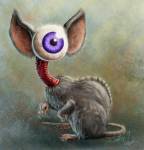
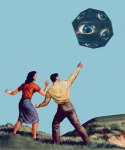


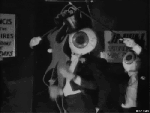
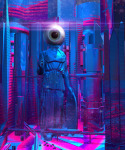



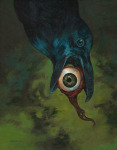
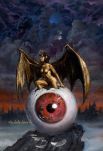
November 17, 2019
(Art) East of the Sun and West of the Moon
[image error]
It’s hard to imagine that anyone hasn’t yet heard of Kay Nielsen, legendary Danish artist and illustrator, but anything is possible. He certainly remained largely unsung in his time. Despite a brief stint at Disney, where he created the “Night on Bald Mountain” segment of Fantasia, as well as concept art for a number of adaptations of Hans Christian Andersen fairy tales (including The Little Mermaid, which wasn’t used until 1989), he was let go after four years and spent the remainder of his life in relative poverty. He died in 1957.
Before his wife joined him a year later, she gave his book of illustrations, which included unpublished work on The Arabian Nights, to American architect Frederick Monhoff, who tried to get them placed in museums. None would take them. This year, Nielsen is the subject of a large retrospective (through January 2020) at the Museum of Fine Arts, Boston, and he is widely recognized as a master illustrator of the “golden age of illustration” (lasting from the advent of Daniel Vierge’s printing technique in the 1880s to the point that drawings and paintings could be reproduced with relative ease, from the 1930s on).
His first English commission was 24 color plates and more than 15 monotone illustrations for In Powder and Crinoline, Fairy Tales Retold by Sir Arthur Quiller-Couch (known as The Twelve Dancing Princesses in the US) in 1913. In the same year, Nielsen was also commissioned by The Illustrated London News to produce a set of four illustrations to accompany the tales of Charles Perrault; Nielsen’s illustrations for ‘Sleeping Beauty’, ‘Puss in Boots’, ‘Cinderella’ and ‘Bluebeard’ were published in the 1913 Christmas Edition.
A year later in 1914, Nielsen provided 25 color plates and more than 21 monotone images for his most famous work, the children’s collection East of the Sun and West of the Moon. The color images for both In Powder and Crinoline and East of the Sun and West of the Moon were reproduced by a 4-color process, in contrast to many of the illustrations prepared by his contemporaries that characteristically utilized a traditional 3-color process, which no doubt contributes to their lasting beauty. (Adapted from Wikipedia)

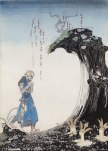
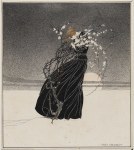
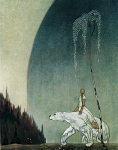
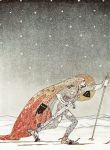
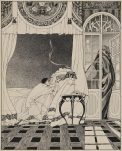
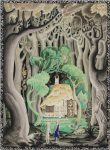
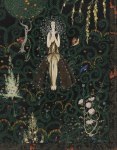
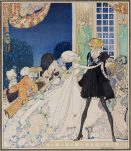
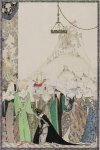
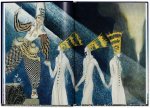
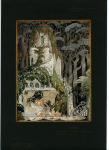

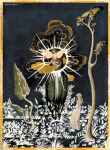
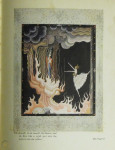
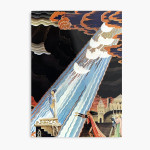

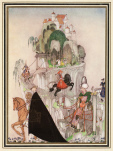
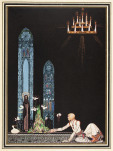
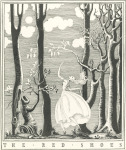
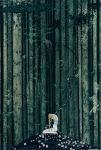


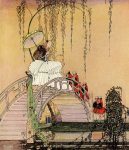
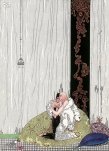
November 16, 2019
November 15, 2019
(Art) The Data Art of Ward Shelley

I worked in ‘Data Science’ when it was called statistics, before that became a bad word, which is where I first encountered Charles Minard’s 1861 representation of the losses during Napoleon’s 1812 Russia campaign.
It’s an early and classic example of how tell a story with data. The figure not only shows the size of the army over time but also location and direction of travel mapped to temperature at the bottom, which Minard argued was crucial to the outcome. (This version has been edited slightly from the original to create more contrast.)
[image error]
I found it, as I suspect most people have, in Edward Tufte’s “The Visual Display of Quantitative Information” (1983) which is a classic text in the field.
Unlike in Minard’s time, when data was a prize, today we are inundated. Data and its visualization is an everyday feature of our world, from the weather report in the morning to our health app before bed, from the dashboard in our car to the dashboard report at work, which makes it a suitable topic for art. Call it the landscape of the 21st century.
Ward Shelley makes art of data visualization. The results are astounding.
My paintings/drawings are attempts to use real information to depict our understandings of how things evolve and relate to one another. They are about how we form these understandings in our minds and if they can have, in our culture, some kind of shape.
Usually I choose topics from art or cultural history, such as the arc of an artist’s career and its influences, or the effect of particular ideas in an aesthetic or political movement. They are “wide-screen”, with all information available to the interacting eye at every moment.
In a sense, once the topic of a painting is chosen, the content is “determined”. It is history, a matter of record. But we know this content is mediated in a thousand ways before it takes shape in our awareness. Moreover, content is also shaped by the receiving mind which, as a pre-existing form itself, exerts a strong shaping influence (contemporary studies of cognitive dissonance are describing this effect).
These paintings are oil paint with a special alkyd binder and toner on frosted mylar. I chose to work with oil paint because of the deep radiant transparency of the colors when used as glazes, which enhances and not obscures the texts. Mylar was chosen as the ideal surface because it is archival, because its smooth surface allows for fine detail, and because it allows the light to penetrate and bounce through the color.
These works are full of compact information. It takes months to collect and organize the information on a page; it is done with pencil on paper because each piece goes through constant revisions during this time.
Three versions of the painting are made from same information. Normally the pencil drawing goes through minor changes from version to version, and the painting is entirely different, using different colors and brushwork.
Click to enlarge.
The History of Science Fiction
[image error]
The Life and Work of Frank Zappa
[image error]
Who Invented the Avant Garde?
[image error]
His Data Archives
[image error]
The Jewish Diaspora
[image error]
Genres of Rock ‘n Roll
[image error]
Autobiography of the Artist
[image error]
Portrait of Chris Burden
[image error]
November 14, 2019
On getting attention: Politics is a very good way to do ...
[image error]
On getting attention: Politics is a very good way to do it, as I inadvertently discovered last Friday, but only to the degree one is comfortable with simplicity.
On keeping attention: I hear so many creatives complain about abandonment. If people unsubscribe or stop following you, let them go. Be glad they are gone. They were a lie. They were never going to buy your thing. Focus exclusively on those who will.
art by Bob Haberfield
November 12, 2019
(Fiction) The Collector
[image error]
Gilbert Tubers shuffled down the street in a huff, clutching the most valuable thing in the world. It was tucked under his arm inside a glass jar, and he admired it every twenty paces while he stopped to rest. His heavy breath came in rhythmic ebbs, and inside the hood of his yellow hazard suit, it both obscured the street noise and blurred the round visor in a moist fog. Gilbert held the jar close and peered at the little passenger through the thin, fogless rim of the glass portal. He smiled and shuffled off again.
Those few people left in South Carton, the dark, crumbling, trash-ridden hind end of Freecity, crossed the street when they saw him coming. They did it nonchalantly, as if that was their intended route and crossing had nothing to do with the funny man in the radiation suit. Not that Gilbert minded. In the fourteen years since the accident, people had faded from his life like music from a deaf man.
It was hot and humid after all the rain—even more so inside the heavy suit—and Gilbert’s ass cheeks were well lubricated by the time he reached the abandoned tenement where he made his home. He could feel beads dribble one by one down the back of his legs like falling suicides. He rested at the top of the stairs for a moment and let them drop while he caught his breath. The lead suit was heavy, and he resolved to take a shower before unwrapping his prize.
As he walked through the door, the fairies in the large glass terrarium at the other end of the loft fluttered behind a rock. Gilbert heard sounds and remembered he had left the music on for the plants, which had withered in their pots. He set the jar on his workbench, next to a stack of Amateur Fairyer magazines, and walked to the windows to examine potted death. Fourteen plants, one for each year—some hanging, some stacked on books, all the leaves dry and crusty. He noted the date and time in the open logbook. This batch had taken less than twelve hours to die, a record.
Gilbert switched off the turntable and stripped out of the heavy suit as he walked to the bathroom. His thinning hair was wispy, and it reached for the ceiling as he removed his hood. His condition was getting worse. He could feel it. He was filled with energy. He barely slept. He had headaches every night. He needed answers soon. He showered and tried not to think about it.
Sitting at his workbench, minty and damp, he stared into the glass jar at its eyeless passenger. The dome of the creature’s cranium reached across its forehead and ended at two fleshless, skull-like nasal openings. Its skin was gray and soft. Its phalanges looked long enough to strangle a man. Its camouflaged wings resembled dead, black leaves, and they snapped together in angry clicks as the creature hissed at Gilbert through rows of tiny serrated teeth.
Gilbert set the glass jar down next to the terrarium. His three remaining live fairies, a male western crested blue fay and two female pink Winkler’s pixies, peered at the new arrival from behind the rock. The withering sprite was larger than the others by several inches. Gilbert wondered if it looked like a giant to them, or if, like insects, they were too stupid to notice. Either way, at least they were cowering at something besides him.
Gilbert took out the mounting block he had made for the withering sprite. He’d carved it custom. The withering was so rare, McMasters didn’t even keep a specimen tray large enough in stock. Gilbert pressed the inlaid cork to make sure the glue had dried. Then he pasted the information card to the right side.
Species: Withering Sprite
Genera: Winter
Gender: Unknown
Habitat: Unknown
Average Size: Unknown
Unknown, he thought. Perfect.
Gilbert looked up at the rear wall of his loft. It was covered in specimens: pixies, fairies, fay, and sprites of all sizes and colors hung inside small wooden blocks, sorted by genera, color, and type. Gilbert had a sizable collection of autumn and summer varietals and quite a few spring as well. Similar species tended to show similar coloration, and so there was a splotchy rainbow effect on the wall. Warblers tended to be purple or violet-hued—except for that blasted green meanie—and Gilbert had arranged them in a cluster near the bottom. Above the warblers were the mint pixies, then the dark spotted, then the western and eastern light spotted, and so on up to the crown jewel: Gilbert’s exhaustive collection of razorbacks, all reddish-hued and violent.
He had mounted the razorbacks in live-action poses, wielding small sticks like swords and poised mid-strike. (It was well-known that razorbacks, besides being potent insect-hunters, were one of the few species intelligent enough to use tools.) Taken together, the red collection looked like a dance of devils, a miniature dark mass, photographed and frozen.
In the center of everything was a picture of Gilbert’s dad. Carl Tubers had died of a stroke in a crowded elevator. Rush hour patrons had come and gone while he clutched his chest in silent agony, unable to move or call for help. Pressed to the back of the car by the crowd and then released, over and over, the coroner estimated Carl was stuck there, clinging to the rail, for the better part of an hour, surrounded by people who could help.
“Sorry, Dad.” Gilbert took the picture off the wall and looked at it. His dad was bald and scrawny and smiling. “You were only just a placeholder.”
Gilbert hung the empty mounting board on the vacant nail. It fit perfectly.
He walked back around his cluttered workbench and picked out the supplies he needed: the jar of ether, a cotton ball, an extra-large skewering needle. He cleared a stack of medical texts and set the equipment down. The withering sprite had stopped hissing at him. Its tentaclelike phalanges were pressed to the glass. A thick, mucous drool hung from the edge of the sprite’s rounded mouth as its eyeless head stared at the cowering fairies. Their tremors shook their wings, which shed a sparkling dander that floated down to the terrarium floor.
“I bet you’re hungry,” Gilbert said. “You had a long trip. How about one last meal?”
Gilbert loosened the top of the jar and placed it inside the terrarium. The pixies shrieked in high-pitched squeaks, like a record player run too fast. The two pink Winklers hid behind the crested male, who was standing upright, chest puffed, head and neck glowing blue, as the withering sprite worked the lid off.
The metal top fell with a clatter and the dark sprite fluttered out on black wings. It hovered in the air for a moment, and Gilbert thought maybe it wasn’t hungry after all. But as soon as he reached for the ether, the sprite swooped down on the crested blue, two-thirds his height, and batted him out of the way.
“Hmm . . .” Apparently it had a taste for Winklers.
The withering grabbed the closest pink, who was trembling and covering her eyes in fear, and sank its rows of teeth into her head. Gilbert could hear a slight sucking sound as the sprite inhaled the sap from her body. Her eyes rolled to the back of her head and Gilbert watched her tiny body shrivel like plastic wrap under the withering’s slow, steady sucking.
For his part, the crested blue was still trying to drive the giant away, but he was no match in size or ferocity. The withering sprite grabbed him by the head and dragged him, struggling, toward the second Winkler, who curled into a ball in the corner and sobbed uncontrollably. Her pink gossamer wings trembled to a blur.
The black sprite lifted the little pixie by her feet and bit into her side like an apple. There was a short shriek, then the slow, steady sucking again before she too was reduced to wrinkles stretched over a tiny skeleton. A bit of pink pixie sap dribbled down the sprite’s neck, and after it tossed the Winkler’s corpse aside, it wiped its face with the back of its hand. Then it lifted the crested blue, took off his head in one clean swipe, and started to munch on his thick, azure wings.
Gilbert watched the glow of the blue’s head fade. When it was dark, he again reached for the ether. As he dropped a soaked cotton ball into the terrarium, he heard a sliding sound. He turned and saw something in the middle of the floor. It was black. An envelope. It had come from under the door. He listened. There was nothing.
He stood and walked toward the door. He listened again.
Gilbert lived in an abandoned building. There was no one within a half-mile in any direction. He was certain of it. He didn’t want to make anyone sick, especially now that his condition was accelerating. He didn’t receive mail. He didn’t have guests. People didn’t dare be within a hundred feet of him, even when he wore the lead-lined radiation suit.
Gilbert reached down and picked up the envelope. It was sealed. He turned it over. No address. No writing. Just a stamp in black. Black ink on black paper. Gilbert recognized the symbol and his heart beat faster. It was time. He took a long, deep breath and walked back to his desk and sat down, turning the jet-black sleeve over in his hands. The paper was thick and firm. Expensive. He opened it gently and sat back in his chair before removing the contents.
There was a gray vellum card with black letters struck by a broken typewriter. Tiny bits of ink splatter hugged the characters. At the bottom, the same black stamp: an open hand, palm up, fingers pressed together.
cover image from the “Thomas Merrylin Museum” by AlexCF
text from my hyper-paced, grotesque first novel, FANTASMAGORIA.
[image error]
November 11, 2019
Get your new digital self. Avatars sold here!
“Avatar” b...
[image error]
Get your new digital self. Avatars sold here!
“Avatar” by Andrey Surnov



